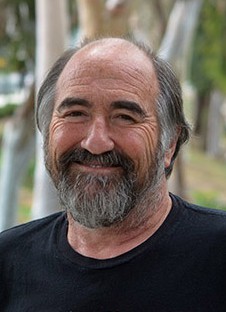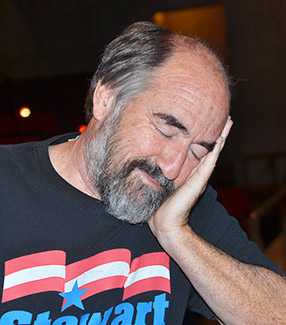Do smartphones make people smarter?
When considering how they affect people’s sleep, the answer is no, according to Larry Rosen, professor of psychology at California State University, Dominguez Hills (CSUDH).
Rosen and fellow CSUDH psychology professor Mark Carrier, along with three graduate students, surveyed more than 700 college students to study and determine how the use, and misuse, of technology affects the amount and quality of sleep they get each day. The study, which is currently under review, found that smartphones play a major role in reducing students’ sleep and interrupting their sleep patterns.

“Multitasking has increased dramatically over the past 10 years, and I think you can trace most of it to the smartphone,” said Rosen, who had been teaching at CSUDH for 41 years. “We’re carrying this computer in our pocket. It beeps at us and distracts us, it calls to us, and it beckons to us. And for many that’s 24 hours a day.”
The study stemmed from years of research regarding the “psychology of technology” conducted through the George Marsh Applied Cognition Laboratory at CSUDH, which was founded by Rosen, Carrier and Nancy Cheever, professor of communications. Rosen, Carrier and their graduate students wanted to look at brain functioning and how it affects sleep, the anxiety that comes with “missing out on technology,” and the “constant availability of distraction,” according to Rosen.
“It addresses what people are doing with their smartphones, such as sleeping with the phones under their pillows, checking their phones in the middle of the night and first thing in the morning,” said Rosen. “The study goes through all the reasons one might not sleep well, such as the light admitted from our phones, which has been proven to be very counterproductive to sleep as it tells our brain that it is time to wake up and not time to go to sleep.”
In the study, the researchers discovered two important variables that encourage the use and misuse of technology that negatively affects sleep: poor executive functioning, which includes the (in)ability to pay attention, problem solve, control impulses, and make decisions; and anxiety.
“If you’re anxious because you feel you may be missing out on something, you go on social media, which is then reinforced because there’s always something new of Facebook, Instagram or other social media sites,” according to Rosen, who said that in their work, anxiety is referred to as “FOMO,” or “fear of missing out.” “There will always be something online that will reinforce anxiety by having you think, ‘See, it was good I checked.’”
The study also found that FOMO had the strongest effect on student’s sleep, and that students who were more anxious about being apart from their phones used them more during a typical day, and woke up to check their phones more often at night.
“So many of our social interactions are electronic now, but it’s not just young people. Go into a restaurant and you’ll see middle-aged people with their phones on the table,” he said. “There are too many things to do in too little time. We’ve evolved a long way from going to sleep when the sun goes down and waking up when the sun comes up. We choose to spend our time overloaded–our kids in particular.”
Rosen is also concerned about other cognitive and particularly memory issues that may be the result of sleep deprivation due to constant multitasking and the overuse of technology, and said that a decade ago memory loss used to start much later.
“This is new to me, but what now really worries me about lack of sleep–it’s not enough that your brain doesn’t function as well–what happens during sleep is a tube in your body from your spinal cord to your brain opens a little bit to send a little more fluid into your brain to wash out toxins among which are beta-amyloids,” said Rosen. “Having all those excess beta-amyloids in your brain may put you at risk for having a brain that is not functioning clearly. And people with Alzheimer’s Disease tend to have an excess of beta-amyloids in their brains.”

For students who are having trouble getting enough sleep, Rosen suggests keeping your smartphone or tablet at least 14 inches away from you while in bed, to dim the brightness of the screen; or just put the device away an hour before going to sleep.
“Almost everyone is operating on at least a little bit of sleep deprivation, and for college students it’s often a lot. I often tell them that the last couple of hours of studying is a waste because they’re tired, that they’re not really processing the information very well,” he said. “So why bother? Go to sleep early and get up early, then you’ll be fresher.”
But for students who need to burn the midnight oil the night before an exam, Rosen suggests students take short 20-minute naps.
“The research is new and a bit scant, but it’s believed that short naps do something to your brain–they do some housekeeping. When you take a nap you often start dreaming immediately,” said Rosen, who admitted he has never been a “big fan” of naps. “During normal sleep you don’t start dreaming for 90 minutes, but when you’re overtired you start dreaming right away. There’s something that goes on during that REM sleep that’s healthy for your brain.”
Rosen and his colleagues are considering expanding their research into the realm of brain scanning using their Functional Near Infrared Spectroscopy (fNIR) device that measures mental activity in the prefrontal cortex, which provides one’s executive functioning including attention, workload, decision-making, impulsivity and problem solving. Brain scanning may help assess the impact of sleep debt on executive functioning and inform further research in this area, according to Rosen.